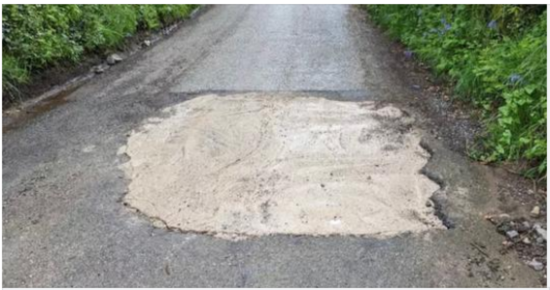Authorities in Cornwall, England, alongside the Public Works Department, are in pursuit of an elusive motorist suspected of taking unauthorized action to mend a substantial pothole by filling it with cement.
Residents of Cornwall are accustomed to the challenges posed by the region’s roads, yet the inhabitants of Lostwithiel faced additional inconvenience in navigating around a sizable cavity at the intersection of Tanhouse Road and Bodmin Hill.
Formal closure of the road occurred at the outset of April, with a representative of the Cornwall Council attributing the deterioration of the road surface to an ongoing drainage issue.

Following a month of governmental inaction, an anonymous individual, evidently frustrated by the persistent pothole, undertook a DIY initiative to rectify the situation by filling it with concrete over the first weekend of May. While this makeshift repair temporarily alleviated the problem and facilitated the reopening of the road, Cormac, the road repair contractor for Cornwall Council, subsequently shuttered the thoroughfare due to the absence of official intervention.
Now, Cornwall Highways officials are diligently seeking the responsible party, highlighting that the individual in question removed signs without authorization.
The road had been scheduled to remain closed until June 9th to address a backlog of pothole repairs. A Cornwall Highways manager appealed to the community for any information regarding the person who executed the impromptu repair.
Colin Martin, the Cornwall councilor representing Lanreath and Lostwithiel, characterized the pothole as emblematic of broader systemic issues stemming from underinvestment in public infrastructure.
In an interview with Cornwall Live, Martin lamented the ongoing closure of the road and attributed it to budget cuts for road maintenance, resulting in a proliferation of potholes across the region.
This incident echoes a similar instance in Toronto in 2017 when a resident took it upon himself to construct a set of park stairs for a community garden at a fraction of the estimated cost by the city, sparking controversy over unauthorized civic intervention.






